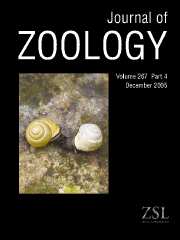Crossref Citations
This article has been cited by the following publications. This list is generated based on data provided by
Crossref.
Heymann, Eckhard W.
2000.
Spatial patterns of scent marking in wild moustached tamarins, Saguinus mystax: no evidence for a territorial function.
Animal Behaviour,
Vol. 60,
Issue. 6,
p.
723.
Woodward, Raymond L.
Bartos, Kim
and
Ferkin, Michael H.
2000.
Meadow Voles (Microtus pennsylvanicus) and Prairie Voles (M. ochrogaster) Differ in Their Responses to Over‐Marks from Opposite‐ and Same‐Sex Conspecifics.
Ethology,
Vol. 106,
Issue. 11,
p.
979.
Dallas, John F.
Coxon, Karen E.
Sykes, Tim
Chanin, Paul R. F.
Marshall, Freda
Carss, David N.
Bacon, Philip J.
Piertney, Stuart B.
and
Racey, Paul A.
2003.
Similar estimates of population genetic composition and sex ratio derived from carcasses and faeces of Eurasian otter Lutra lutra.
Molecular Ecology,
Vol. 12,
Issue. 1,
p.
275.
Begg, C.M.
Begg, K.S.
Du Toit, J.T.
and
Mills, M.G.L.
2003.
Scent-marking behaviour of the honey badger, Mellivora capensis (Mustelidae), in the southern Kalahari.
Animal Behaviour,
Vol. 66,
Issue. 5,
p.
917.
Vander Wall, Stephen B.
2003.
HOW RODENTS SMELL BURIED SEEDS: A MODEL BASED ON THE BEHAVIOR OF PESTICIDES IN SOIL.
Journal of Mammalogy,
Vol. 84,
Issue. 3,
p.
1089.
Rostain, Régan R.
Ben-David, Merav
Groves, Pamela
and
Randall, Jan A.
2004.
Why do river otters scent-mark? An experimental test of several hypotheses.
Animal Behaviour,
Vol. 68,
Issue. 4,
p.
703.
Zrzavý, Jan
and
ŘIčánková, Věra
2004.
Phylogeny of Recent Canidae (Mammalia, Carnivora): relative reliability and utility of morphological and molecular datasets.
Zoologica Scripta,
Vol. 33,
Issue. 4,
p.
311.
Mitani, John C.
and
Watts, David P.
2005.
Correlates of territorial boundary patrol behaviour in wild chimpanzees.
Animal Behaviour,
Vol. 70,
Issue. 5,
p.
1079.
Ashenafi, Zelealem Tefera
Coulson, Tim
Sillero-Zubiri, Claudio
and
Leader-Williams, Nigel
2005.
Behaviour and ecology of the Ethiopian wolf (Canis simensis) in a human-dominated landscape outside protected areas.
Animal Conservation,
Vol. 8,
Issue. 2,
p.
113.
2006.
Verhaltensbiologie.
p.
97.
Randall, D.A.
Marino, J.
Haydon, D.T.
Sillero-Zubiri, C.
Knobel, D.L.
Tallents, L.A.
Macdonald, D.W.
and
Laurenson, M.K.
2006.
An integrated disease management strategy for the control of rabies in Ethiopian wolves.
Biological Conservation,
Vol. 131,
Issue. 2,
p.
151.
Escobar-Ib, I.
., L. Mayagoitia
., C. Gonzalez-Rebeles
., R. Ramirez-Necoechea
., D. Mota
and
., M. Alonso-Spilsbury
2006.
Scent Marking Around the Breeding Season in Two Newly Formed Mexican Grey Wolf (Canis lupus baileyi) Pairs Kept in Captivity.
International Journal of Zoological Research,
Vol. 2,
Issue. 3,
p.
213.
Rosell, Frank
and
Thomsen, Liat R.
2006.
Sexual Dimorphism in Territorial Scent Marking by Adult Eurasian Beavers (Castor fiber).
Journal of Chemical Ecology,
Vol. 32,
Issue. 6,
p.
1301.
Jordan, Neil R.
Cherry, Michael I.
and
Manser, Marta B.
2007.
Latrine distribution and patterns of use by wild meerkats: implications for territory and mate defence.
Animal Behaviour,
Vol. 73,
Issue. 4,
p.
613.
Ferkin, Michael H.
and
Pierce, Andrew A.
2007.
Perspectives on over-marking: is it good to be on top?.
Journal of Ethology,
Vol. 25,
Issue. 2,
p.
107.
Franklin, Samuel P.
Miller, Kimran E.
Baker, Andrew J.
and
Dietz, James M.
2007.
Do cavity‐nesting primates reduce scent marking before retirement to avoid attracting predators to sleeping sites?.
American Journal of Primatology,
Vol. 69,
Issue. 3,
p.
255.
Jordan, Neil R.
2007.
Scent-marking investment is determined by sex and breeding status in meerkats.
Animal Behaviour,
Vol. 74,
Issue. 3,
p.
531.
Randall, Deborah A.
Pollinger, John P.
Wayne, Robert K.
Tallents, Lucy A.
Johnson, Paul J.
and
Macdonald, David W.
2007.
Inbreeding is reduced by female-biased dispersal and mating behavior in Ethiopian wolves.
Behavioral Ecology,
Vol. 18,
Issue. 3,
p.
579.
Iossa, Graziella
Soulsbury, Carl D.
Baker, Philip J.
and
Harris, Stephen
2008.
Body Mass, Territory Size, and Life-History Tactics in a Socially Monogamous Canid, the Red FoxVulpes vulpes.
Journal of Mammalogy,
Vol. 89,
Issue. 6,
p.
1481.
Berzins, Rachel
and
Helder, Rémi
2008.
Olfactory communication and the importance of different odour sources in the ferret (Mustela putorius f. furo).
Mammalian Biology,
Vol. 73,
Issue. 5,
p.
379.




